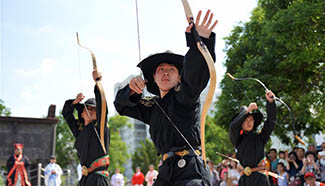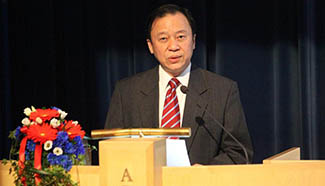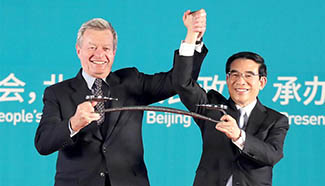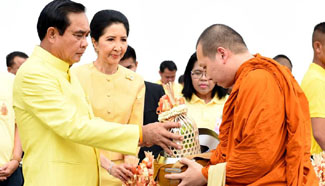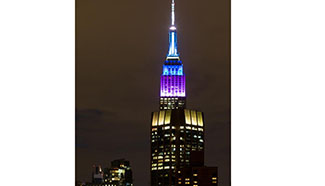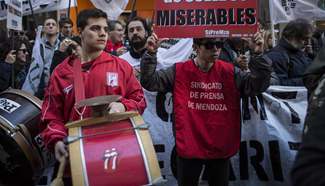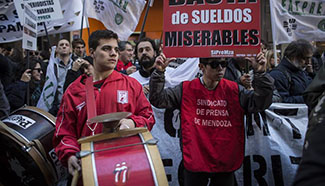Hillary Clinton at the Hillary for New York Primary Night Party in April, 2016. (Photo by Louise Wateridge/Pacific Press)
By Xinhua writers Zhu Lei, Qi Zijian
NEW YORK, June 8 (Xinhua) -- Hillary Clinton declared victory Tuesday night in the U.S. Democratic presidential race after months of battle with an unyielding long-shot challenger, becoming the first American woman to win major party nomination.
Also on Tuesday, House Speaker Paul Ryan, the country's now highest-ranking Republican, called his party's presumptive presidential nominee Donald Trump's recent remarks about a Hispanic-American judge as "the textbook definition of a racist comment." But he said he would still back the brash New York billionaire in his bid for the White House.
Looking like a coincidence, the two separate events vividly illustrates the strife in the 2016 U.S. elections between the establishment and outsider candidates in both parties, driving the country to a political crossroad where it is forced to make choices.
As the primary season is coming to an end, Clinton, a big name after nearly four decades in public life, is entering a duel with political outsider Trump, well-known to Americans since being a TV reality show star but never elected to public office.
In the next six months, a more divided U.S. political arena looms in sight as two of the U.S. most polarized figures will wage a war for the White House, extending the division within each party to a national stage.
Notably, anti-establishment candidates are posing unprecedented challenges to the U.S. political elite this year, tapping into the anger of among voters against their own party.
On the Democratic side, Bernie Sanders, a self-described democratic socialist that campaigned with a "fight for social, economic, racial and environmental justice," has sent the establishment a message they can't ignore: a large section of the Democratic electorate is unhappy with and won't settle for the status quo.
His positions against the wealthy on the Wall Street, the corrupt campaign financing and choking student debt have resonated with progressive and young voters.
Sanders and his supporters have complained that the nomination process was in favor of Clinton, including closed primaries in major states such as New York, and the use of super-delegates, the party insiders who can back any candidate at the convention regardless of how people voted in primaries and caucuses.
Arguing that Clinton's lead was largely based on her wide advantage among the 714 super-delegates and that he was in a better position to defeat Trump in a general election, Sanders has defied pressures from party bigwigs on him to bow out, vowing to carry "political revolution" to the Democratic national convention scheduled for July in Philadelphia.
By doing so, Sanders, the longest-serving independent member of Congress in U.S. history who ran as a Democrat in the 2016 race, has inflicted unexpected serious damage on the party favorite Clinton, leaving Democrats with wounds not less deep, if not deeper, than Republicans.
More than 572 super-delegates already endorse Clinton, while only 47 super-delegates support Sanders, who was hardly known to most voters a year ago. A Hillary Clinton presidency is viewed by many as a third term of her husband Bill Clinton and succession of Barack Obama's "political legacy."
On the Republican side, polls showed a majority of Trump's die-hard supporters are blue-collar white voters frustrated and angered by the U.S. status quo. It is the populist Republican base, other than Trump's per se or what he stood for, that has helped him vanquish 16 opponents in the nomination.
Still reeling from Trump's hostile takeover of the party, the Republican establishment is slowly rallying behind Trump whose positions on trade, foreign policy, immigrants and taxes have appalled the party leadership.
It seems that the fractured Republican party starts to heal. However, Ryan's statement that "we have greater likelihood of getting our policies enacted with him than we do with her" when he "absolutely disavowed" Trump's "racist" remarks was indeed a public display of frustration and power struggles within the party.
As the two men represent vastly different visions for the Republican party, Ryan's concerns also reflect confusion and frustration among a large sector of the voters. A CBS/New York Times poll in March found Clinton and Trump were viewed more unfavorably than any front-runner for either party since 1984.
The dust of the primary season is going to settle. However, the tumultuous, ill-tempered primaries, including insulting personal attacks rather than debates about issues, serve as just a preview of what is to anticipate in the general election.
Who will eventually set foot in the Oval Office could somehow hinge on whether the rival party is more divided. But the fight between the elites and the outsiders offers no solution to the anger and frustration in the American society.
Related:
Clinton leads in California primary, Sanders vows to continue
LOS ANGELES, June 8 (Xinhua) -- U.S. Democratic presidential candidate Hillary Clinton led in Tuesday's party primary in California with 56 percent of the votes, according to results released after over 92 precincts partially reported as of early Wednesday morning.
Her rival Bernie Sanders got 43 percent and vowed to continue his campaign. Full story
Hillary Clinton projected to win Puerto Rico primary, very close to party nomination
WASHINGTON, June 5 (Xinhua) -- Democratic presidential candidate Hillary Clinton was projected to win the 60-delegate Puerto Rico caucuses on Sunday night, leaving the former state of secretary within a foot of becoming the first-ever female nominee of a major political party in the United States, according to TV networks.
With 22 percent of the vote tallied in Puerto Rico at 9:30 p.m.(0130 GMT, Monday), Clinton had secured about 31 delegates, plus six of the island's superdelegates, said a The Hill news report. Full story




